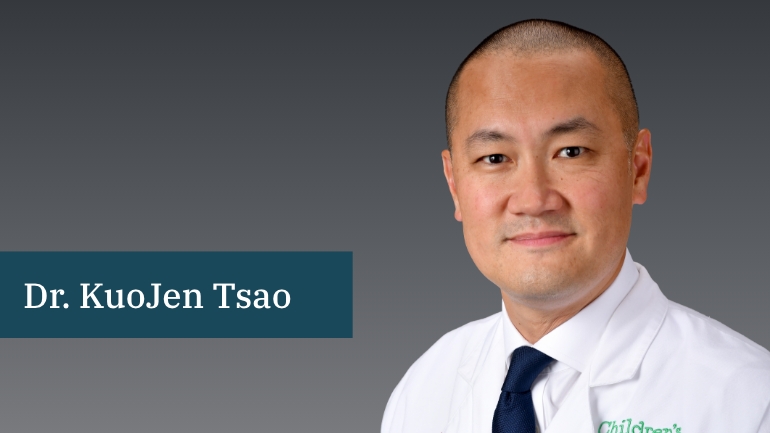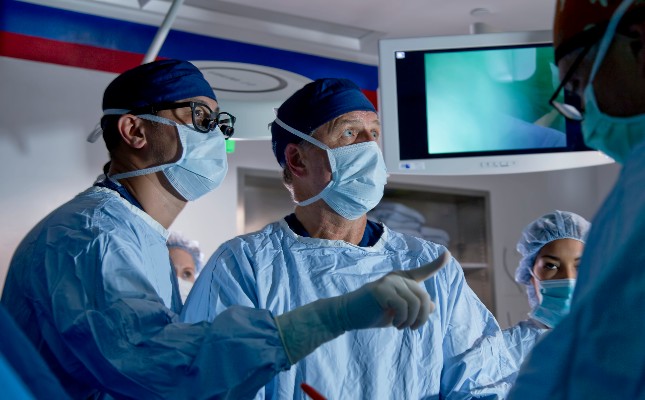Defining Excellence – What makes a Fetal Center?
The emergence of new fetal procedures has led to a proliferation of programs using the designation “fetal center” without clarification of what referring physicians and patients should expect in terms of quality, patient safety and outcomes. In response, the state of Texas and providers affiliated with The Fetal Center at Children’s Memorial Hermann Hospital, in partnership with McGovern Medical School at UTHealth Houston and UT Physicians, are collaborating to determine criteria that define Centers of Excellence for Fetal Diagnosis and Therapy.

Defining Excellence – What makes a Fetal Center?
Andrew Wilner, MD (Host): Welcome to Advance, the podcast that shares the science and stories of advancing health and personalizing care at Memorial Hermann Hospital. Dr. Andrew Wilner, Associate Professor of Neurology at the University of Tennessee Health Science Center in Memphis Tennessee, interviews Dr. KuoJen Tsao, an affiliated physician at The Fetal Center at Children’s Memorial Hermann Hospital and is Chief of the Division of Pediatric General and Thoracic Surgery at UTHealth Houston and Co-Director of the Fetal Center at Children's Memorial Hermann Hospital. Dr. Tsao will be discussing how he and other providers are partnering with the state of Texas to develop criteria that will define the type of clinic that qualifies as a fetal center. Now, here’s Dr. Andrew Wilner interviewing Dr. Tsao.
KuoJen Tsao, MD (Guest): Thanks. Thanks for having me.
Host: To start Dr. Tsao, would you tell us which types of services are offered or should be offered at a fetal center?
Dr. Tsao: Yeah, that's a great question. I think that there are all sorts of flavors of fetal centers. If you look at the folks around the country, I would define ours as probably the most comprehensive and there are a few others out there. And when I talk about comprehensive, I really talk about the full gamut of taking care of the mother, as well as the baby. Pregnant patients come to us because they've been diagnosed with a prenatal problem of sorts and that problem can sometimes be managed medically. They need to be either observed. Sometimes they need to have a more controlled, or a sort of, birth plan be put into place. Because we know that sometimes when these babies are born, they're at high risk. There's things that could happen to them. And they're not always the best patients to deliver without the proper amount of services. And then sometimes we have kids that are diagnosed, they get in trouble while they're pregnant, or as soon there afterwards. And one of the things that we've been able to develop and offer patients is sometimes what we call prenatal or fetal surgery. And when you take the full gamut of all the services that we provide, pediatric specialists, OB specialists, and maternal-fetal medicine specialists, we are able to cover almost everything that really comes through the door. And that's not always the case with different types of fetal centers. So, it's important for us to make sure that when we hang our shingle on the door and we say we're a fetal center, that people understand, what they're getting and what to expect.
Host: Well I think from the patient's point of view, it's certainly advantageous to go to a place where they know whether it's a problem with the baby or a problem with the mother, that there's people there to take care of it, because often those problems don't announce themselves until the last minute. And you can't really plan. So you want everybody to be available.
Dr. Tsao: Yeah, no, that's definitely true. I think the biggest thing that we sometimes offer families is one, the right information. Part of their education, they need to learn about their pregnancy, but they also need to understand what's happening to their baby and what to expect. And I often tell patients that if you end up delivering with us, yes. It's important that you deliver at a place that we can take care of the baby afterwards. But the more important thing about coming to us that we know you're coming and that when you deliver, there's no surprises by the medical team or the hospital. And sometimes that's a big hurdle that we have to overcome.
You know, we don't want kids out in the community or another hospital that is born with a problem that could have been managed. But just because they're in the wrong facility ends up having not the greatest outcome, that they could have. So that's a very important point that you bring up.
Host: Now, I'm a neurologist and we have epilepsy centers and stroke centers. And usually, now we have like categories, level one, level two, like a trauma center, a level three. Does that exist in the fetal surgery world?
Dr. Tsao: It doesn't right now. And part of that is because the specialty that we live in, even though it's not quite in its infancy, it's probably in its teenage years, if I want to put it that way. Certainly the medical therapies exist. But all the things sort of around it to ensure the quality and safety of patients has not been regulated. And hasn't been looked at by outside institutions. And so it's incumbent on the good practicing physicians and nurses in the hospitals and the centers to police themselves to ensure the high level of quality. So as you have defined it, other centers or other services, ICU care, in neurology, heart care, it's gotten to the point where, yes, we have different levels, to ensure a certain level of service that can be provided. And then there's a bit of an oversight from an outside institution or some outside eyes, just to make sure that what you're doing is on par with what we think is the right thing to do. So, it hasn't been the case in the fetal therapy world yet, but we're working on it. We're trying to make it happen because I think it'll just elevate the quality of all the care around the country.
Host: Well, I understand you've been working with the state of Texas to define what exactly a center of excellence for fetal diagnosis and therapy is. Could you share with us your progress?
Dr. Tsao: Yeah. I think anything with the state, sometimes it goes fast. Sometimes it goes slow. We've been working at this for several years now. We were fortunate, several years ago to be approached by the state and they have taken upon themselves to sort of certify or authenticate different levels of care for a lot of different things, neonatal intensive care units, trauma centers, et cetera. And so the concept of sort of verifying fetal centers was brought to us and we, with some other folks around the state were invited to provide our expert opinion. And we helped them draft a bill, a resolution that the state was going to take this on.
And, at this point we're working with them to define what makes a fetal center. As you asked me before. What are the criteria in which fetal centers should exist? Maybe what some of the benchmarking outcomes that should be reported, and all that, so that we can create a package for patients to say, you know what, you're coming to a center that's been verified and you should have the confidence that what we're telling you as a center, is what we can deliver as a center. It's been a little bit of time, but we're still working and I think within a year, we'll probably launch the program throughout the state.
Host: And hypothetically, that could be a national guideline for each state. Hopefully each state doesn't have to reinvent the wheel.
Dr. Tsao: Yeah, we've already been approached by several folks. I represent the Professional Society for Fetal Therapy Centers throughout the country. It's called the North American Fetal Therapy Network, which I just came off being the chair of the board. We were approached really to help define what the fetal center and help measure the outcomes and whatnot. So, I think it's going to happen. It may be a little bit slower in parts of the country, may be faster, but it's something that I think really needs to happen.
Host: Let's switch gears for a minute. I'm really kind of having trouble wrapping my head around the idea of fetal surgery. That just sounds too hard. Could you give some examples of the kinds of things you can actually fix?
Dr. Tsao: I think the first thing I would probably want people to know is that the concept of fetal surgery or fetal therapy, doesn't necessarily all live within one specialty. And I think that's really unique to what we do. So some of it is performed by maternal fetal medicine specialists that kind of live in the OB world. Some of it is performed by surgeons, pediatric surgeons and neurosurgeons and whatnot. But we do this as a team and most fetal centers will have a group of specialists that brings all their expertise to the patient to really provide the best outcome. Fetal surgery itself is a spectrum. The first thing is really with diagnosis and to be able to come to a center that can properly not only find the problem, but then understand how to prognosticate it for the patient. Meaning is this a life-threatening condition? Is this something that won't be an issue at all? Is this something that we can wait and deal with it after the baby's born?
And so that's very, very critical in how we approach patients. For the conditions that we think are life-threatening while the baby's still in utero, or it's something that we know that we can fix, that changes the outcome after the baby's born, then that would be something that we would highly consider offering patients. So, there are things that either it can be done sort of very, very minimal, conditions to the mom. Some things are needle based and we inject medicines. We sample blood, things that we can do with the needle go directly into mom like an amniocentesis would be a technique. Sometimes we do things with little cameras and we can put a little camera inside the mom through the skin, through the uterus and we can operate or, sample or do things, to the fetus or even the placenta. So, a common operation that we offer in our center is the laser ablation for twin-to-twin-transfusion syndrome. And that's a condition where two babies and two different sacks are sharing a common placenta.
And for whatever reason, that sharing of the placenta is fairly unbalanced, one baby's getting more blood, the other baby's getting less blood. And eventually that baby that's getting less blood is going to not do well. Either one could not do well. But it's just going to be an unbalanced thing where maybe one baby doesn't survive.
And so we can put a little camera inside and using lasers, essentially separate the placenta and, remove some of the abnormal blood vessels that's making it a very unbalanced situation. So, that's a technique and operation that we would offer patients.
Host: Could you potentially save both, babies doing that?
Yeah.
Dr. Tsao: Most of the times you would save both babies and the goal is to save both babies. But sometimes one baby doesn't do well and the goal is to save one, that's certainly possible. The goal is definitely save two. Sometimes we run into conditions, where doing the little camera and the little scopes are not good enough and we have to open up the mom and open up the uterus so we can actually get our hands physically on the baby.
So, some babies are born with large tumors, that might be blocking the heart or keeping the lungs from developing properly, really causing problems to the baby. And we know if we remove it fairly early in gestation may be in the mid- trimester, early in the mid-trimester, and we can put the baby back and let the baby continue with the pregnancy. They'll continue to grow and do better.
That's a situation that maybe the baby wouldn't survive at all if we didn't do anything about. And then sometimes we combine the two. So the common procedure that we do sort of these days is fixing spinal bifida, and that's a condition that actually may not threaten the baby's life while they're pregnant, but we know that if we can fix the spinal bifida early in the gestation, then their outcomes are actually better and that's a procedure we can do by actually what we call open fetal surgery.
We open up the mom and the uterus and fix it like we would do after the baby's born. Or today, we can do that with little cameras as well. We can fix the whole spinal bifida with a few small cameras, in the uterus and not have to open mom all the way.
Host: Does that preserve function? I know with spinal bifida often there's no leg development or can't walk. Are you just patching the hole, or are youactually, is there a functional improvement?
Dr. Tsao: We're doing both. And there's a distinction I think, you know, as you're saying, between functional improvement and the preservation. And right now, we're in the mode of preservation. And sometimes we do get patients that have lost a bit of function that we can tell from prenatal imaging, but we know that they'll benefit from other things. When we patch the hole, we actually can prevent them from having issues later in their brain. They develop a condition called hydrocephalus where the fluid builds up in the brain and spinal bifida kids could require what we call the shunting, VP shunting, where they have to drain the fluid into the abdomen.
And so those are not great things for the baby or the kid growing up. And so utilizing fetal surgery, if we fix the spina bifida, patching the hole, releasing the spinal cord into a more natural state, we can decrease the need for that VP shunt. If kids are walking and or at least moving their legs while they're in utero, we can preserve that function and keep it from getting worse as they go through their pregnancy. So it's a little bit of a combination of both, and it kind of depends on what the situation specifically is for that patient.
Host: Thanks for that. So how does a woman know if she needs to go see you?
Dr. Tsao: I think what the obstetric community has done a great job is obviously identifying problems with the baby. And the first thing really starts with their own obstetrician that through their routine scans, routine testing has picked up a problem. And usually when that's the case, that patient will get referred to a maternal-fetal medicine specialist for maybe a higher level of scanning, a more additional testing and whatnot.
And we will end up getting patients kind of at a third level. We'll get them directly from the obstetrician sort if they're in the Houston area, but sometimes they come from outside the state, outside the region, and those are referrals from other maternal fetal medicine specialists. So most of the time, if they're diagnosed, it's pretty early in their pregnancy, 16, 17, 18 weeks. And we're looking at doing interventions or surgeries, you know, between 20 and 24, 25 weeks, something like that. But it starts on the very front end, their routine prenatal care that they're getting, to make sure they're picking up the things that are potential problems.
Host: Okay, well, to wrap up, is there anything else you would like to add?
Dr. Tsao: I think the biggest thing is that the fetal center, or fetal therapy, I just want to sort of reiterate is really a true multidisciplinary specialty and when patients are coming to see us in the fetal center, it's not really coming to see just the surgeons or just the MFM doctors; but they're coming to see the whole gamut of folks. They're coming to see folks that are taking care of their pregnancy. They're taking, folks that are, going to do potential surgery, but they're also meeting the neonatologists and the genetic counselors and the whole gamut. And so the center really represents a wide discipline of specialists that are taking care of the one mom and the one baby.
Host: Well, it's really terrific that you have such resources available. Dr. Tsao, I want to thank you for your hard work and great explanation of the importance of qualified fetal centers.
Dr. Tsao: Well, thank you for having me.
Host: For patient referrals or to talk to a specialist, please call (713) 383-1464. For more information about the fetal center or to join the email list, to stay up to date on all the latest visit memorialhermann.org/fetal.
I'm your host, Dr. Andrew Wilner. Thank you for listening.
Located within the Texas Medical Center, The Fetal Center is affiliated with McGovern Medical School at UTHealth Houston, UT Physicians and Children’s Memorial Hermann Hospital.


